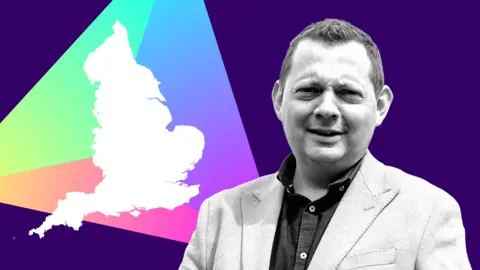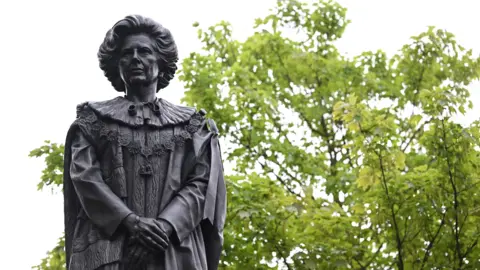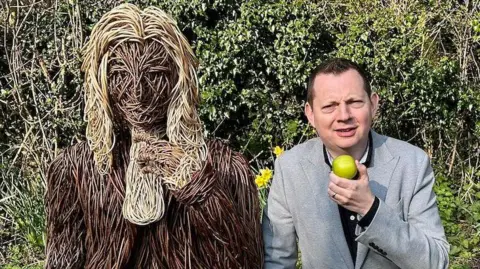Matt Chorley: Local elections might lack glamour - but they matter
 BBC
BBCIsaac Newton knew a thing or two about politics. After the great philosopher and scientist had been struck by inspiration (if not actual fruit) when an apple fell from a tree in his Lincolnshire garden, he went on to become an MP.
Wandering around that same garden, staring at that same tree (or at least a descendant of it) I thought of all those candidates standing in next month's local elections.
Hoping to defy political gravity. Worrying about the optics. Engaging in debates which are more heat than light.
Pushed and pulled by forces beyond their control. Newton would understand the physics of all that.
The reason for my trip to Lincolnshire is because it is right at the heart of some of the big battles on 1 May.
There are elections to the county council here, and to a new Greater Lincolnshire mayor.
As one of the most pro-Brexit parts of the country during the referendum on leaving the EU almost a decade ago, and having elected a Reform UK MP in Boston and Skegness last year, it is perhaps no surprise to see Nigel Farage hoping for further breakthroughs here.
Jaymey McIvor, a Reform councillor, told me his party was taking inspiration from Elon Musk's chainsaw-wielding cuts, promising "a US Doge-style approach to the waste and dis-efficiency that we are seeing in all of our councils".
 Getty Images
Getty ImagesAbout an hour's drive north from here is Doncaster in south Yorkshire, where energy secretary Ed Miliband is an MP, and Labour is defending control of both the council and the mayoralty.
An hour to the west is Nottinghamshire County Council, where elections will test support for Kemi Badenoch's Conservatives, currently clinging on in control but facing challenges from Labour, Reform and independents in what has often been a bellwether area.
Head south from here and reach Cambridgeshire County Council, where Ed Davey hopes his Lib Dems can become the "party of Middle England" by turning their current coalition into a full majority, locking out the Tories.
Steve Jarvis, Lib Dem group leader on Hertfordshire County Council, acknowledged his party was less strong these days in the north but was poised to make gains "across the southern part of England".
And go east from Grantham and you'll find, well, nothing happening: Norfolk County Council was one of nine areas where elections were postponed while the government embarks on local government reorganisation, merging two-tier district and county councils into single unitary authorities.
Andy Mellen, Green leader of Mid Suffolk District Council, called it "a democratic travesty", adding that his party would have been looking to take a "lot of seats" in places where polls were scrapped this year.
Overall voters in parts of England will elect more than 1,600 councillors on 23 local authorities, plus two local authority mayors and four combined authorities mayors.
Runcorn and Helsby in Cheshire might be a good two-and-a-half hour drive from Grantham, but the parliamentary by-election will be one of the most hotly-contested, and digested, set of results on 1 May.
It was triggered by the resignation of ex-Labour MP Mike Amesbury after he was given a suspended prison sentence for punching a man in the street.

It's true that local elections don't have the glamour of a general election.
They struggle to generate national excitement, in part because, as this year, they take place only in some areas of the country.
But they matter: who runs local services, how they're run, how they are paid for.
If you've ever complained about the state of your local roads, the quality of social care, the absence of youth clubs, and, yes, the timing of bins, then this is a chance to do something about it.
The state of local authority finances is also a big national issue too, and with council tax bills rising by on average 5% in England this year, voters will be asking if they are getting value for money.
But these elections matter too, rightly or wrongly, as a national barometer.
How is the government doing? Sir Keir Starmer's name might not be on the ballot paper, but he knows only too well the national impact of local votes.
Campaigning with a fish slice
Four years ago when many of these same seats were last contested, Boris Johnson was riding high in the polls thanks to the "vaccine bounce" which saw Britain gradually emerge from its pandemic isolation.
Sam Smith, the current Tory leader of Nottinghamshire County Council, recalls it wistfully as the "good old days of Conservativism".
In 2021 the Tories not only gained more than 230 council seats and control of 13 councils - highly unusual for a sitting government - but they also won a by-election in the former Labour heartland of Hartlepool.
The results were so bad Sir Keir considered resigning. Aides had to talk him out of it.
Instead he overhauled his team, tore up his policy offer and made Rachel Reeves shadow chancellor. All because of local elections.
This time round there is no bounce in for the government. More of a thud.
Since coming into office Labour have dropped by double digits in the polls.
Labour's Joan Dixon told me she goes out campaigning in Derbyshire with a fish slice.
Not to ward off angry voters - she says she doesn't recognise the collapse in Labour's national popularity - but to poke leaflets through letterboxes without being bitten by dogs.
Badenoch is managing expectations too, warning that a year after the party's worst ever general election result, which saw Rishi Sunak thrown out of power, the Tories were facing a "tough" time at the ballot box.
She might well take heart from another famous resident of this part of Lincolnshire: Margaret Thatcher.
The grocer's daughter grew up above the family shop in Grantham; a statue stands, and is often vandalised, in the St Peter's Hill Green area of the town.
In Thatcher's first set of local elections as leader, - held on 1 May 1975 - months after an election defeat, the Conservatives gained almost 200 seats from Labour.
Badenoch might take note.

If the main parties are downbeat, Farage is all revved up: arriving on stage at his campaign launch on a tractor.
He hopes this could be the moment he finally translates high profile stunts and national poll rises into organised grassroots activism and more elected representation. Then the hard work begins.
Which brings us back to Isaac Newton.
Elected as an MP around the turn of the 18th Century, in protest at King James's anti-Catholicism, he took his seat for two short spells in the Commons.
However, according to the records he spoke only once: to ask for an open window to be closed.
Then, as now, getting elected is one thing. What matters is what you do with it afterwards.
Listen to Matt Chorley live from Westminster weekdays from 14:00 BST on BBC Radio 5 Live.

Get our flagship newsletter with all the headlines you need to start the day. Sign up here.
